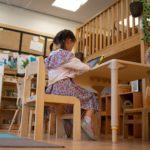 Remote learning became a staple of education during the first year of the pandemic, but while it helped to ensure a degree of continuity, there were nonetheless concerns around the inequalities of provision, especially for students whose home environment was not ideal for learning in.
Remote learning became a staple of education during the first year of the pandemic, but while it helped to ensure a degree of continuity, there were nonetheless concerns around the inequalities of provision, especially for students whose home environment was not ideal for learning in.
Research from the University of Washington suggests that as far as reading was concerned, the shift online didn’t seem to inhibit the ability of youngsters to learn effectively.
“Children are ready to learn to read at the age of 5. But the pandemic robbed children of the opportunity for in-person reading instruction. What we’ve shown here is that an online Reading Camp designed to promote learning socially works phenomenally well,” the researchers say. “An online camp can be used all over the world by children anywhere, and that is truly exciting.”
Reading remotely
The researchers tracked 83 5-year-old pupils during autumn 2020 as they undertook a learning program. The results showed that the students were able to demonstrate clear reading skills, such as letter-sound knowledge or phonological awareness, at a greater level than a control group of children who didn’t receive online instruction.
The researchers moved the two-week summer reading camp that began in 2019 online. Parents of the pupils were mailed materials, such as books, worksheets, and headphones to use during the lessons.
The pupils were grouped into classrooms, each with six pupils and two instructors, to deliver three hours worth of tuition per day, consisting of a series of short lessons broken up by various activities and concluding with a story.
“This shows that we can actually teach kids online if we’re using the correct methodology, keeping them engaged, and they’re interacting socially with their peers and teachers,” the researchers explain. “Combining all of this made it successful.”
To the test
Both those in the Reading Camp and control groups took a number of standardized and non-standardized tests to help teachers assess their knowledge of things such as letters, words, and sounds. The results of these tests showed that those in the Reading Camp group seemed to do better across all measures than their peers in the control group.
“Frankly, we had our doubts about whether 5-year-olds could learn to read online without a live tutor. But when we saw these 5-year-olds on Zoom laughing and encouraging each other to listen and hold up the right color egg, we were amazed,” the authors explain.
“Their social connections to each other were obvious, and their learning was incredible. They called each other by name and seemed very eager to see each other on the screen.”